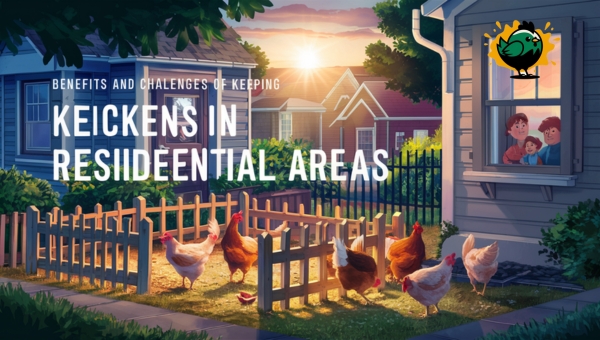Can I Have Chickens Where I Live? Find Out Now!

Are you considering raising chickens but unsure if it’s allowed in your area? This article will dive into everything you need to know, from understanding local regulations to assessing the benefits and challenges of keeping chickens in residential areas.
By the end, you’ll have a clear understanding of how to check local laws, navigate zoning and HOA restrictions, and even explore alternatives if chickens aren’t permitted where you live. Let’s embark on this journey to uncover whether you can have chickens where you live and how to start your own backyard flock successfully.
The Growing Popularity of Backyard Chickens
Raising chickens at home has seen a surge in popularity, especially in urban and suburban areas. This trend reflects a growing interest in self-sufficiency and sustainable living.

Many people are drawn to the idea of having fresh eggs right from their backyard, not to mention the joy of keeping these interesting birds as pets. Social media has also played a role, with enthusiasts sharing tips and experiences, creating a supportive community for new and seasoned chicken owners alike.
Why Understanding Local Regulations is Important?
Before you start your backyard flock, it’s essential to understand local regulations. Researching these laws can save you a lot of trouble down the line.
Here’s why it’s crucial:
- Avoid Fines and Legal Issues: Many cities have specific rules about keeping chickens. Knowing these can help you avoid fines or legal troubles.
- Community Acceptance: Compliance with local laws helps ensure that your chicken-keeping practices are accepted by your community.
- Sustainable Practices: Understanding regulations helps you keep chickens in a way that is sustainable and respectful of your neighbors.
By knowing the rules, you can enjoy your new hobby without any unexpected setbacks.
Can I Have Chickens Where I Live?
Before you start raising backyard chickens, it’s essential to consider several factors to ensure a smooth and enjoyable experience. Here’s a comprehensive guide to help you navigate the process.

Key Considerations for Raising Backyard Chickens:
1. Local Zoning Laws
The first step is to check local zoning laws and regulations. Many areas have specific ordinances regarding chicken keeping, such as:
- Number of Chickens: Some municipalities limit the number of chickens allowed.
- Coop Specifications: There may be requirements for coop design and size.
- Setbacks: Regulations often dictate how far coops must be from property lines.
In many cases, you will need to fill out an application and obtain a permit to keep chickens and construct a coop.
2. Homeowners Association (HOA) Rules
If you live in a neighborhood governed by an HOA, it’s crucial to review their rules regarding livestock. HOAs may have additional restrictions that could affect your ability to keep chickens. If chickens are not currently allowed, you might consider attending an HOA meeting to propose changes.
3. Noise and Odor Concerns
While chickens are generally quiet, roosters can be quite loud, which may disturb neighbors. Additionally, if not maintained properly, chicken coops can produce unpleasant odors. To mitigate these issues:
- Regular Cleaning: Keep the coop clean to manage odors.
- Consider Coop Design: Use products like Coop Recuperate to maintain bedding quality.
4. Space Requirements
Chickens require adequate space for roaming and foraging. A good rule of thumb is:
- 4 square feet per bird inside the coop
- 10 square feet per bird in the outdoor run
Ensure your property has enough room for both the coop and an outdoor enclosure that meets these size requirements.
5. Health and Safety
Chickens can attract predators such as foxes and raccoons. Implementing proper security measures is vital to protect your flock from harm. This includes secure fencing and possibly employing deterrents against predators.
6. Community Support
Before introducing chickens into your neighborhood, consider discussing your plans with neighbors. Address any concerns they may have and seek their support—perhaps even offering them some fresh eggs as a gesture of goodwill! Building community support can make your chicken-keeping venture more enjoyable.
If you’re unsure about specific regulations in your area, consult local authorities or connect with poultry enthusiasts in your community for guidance.
Also Read: The Best Chicken Breeds for Kids-A Fun Guide
Benefits and Challenges of Keeping Chickens in Residential Areas
Delving into the realm of backyard chickens, it’s important to weigh both the benefits and challenges. Let’s dive into what makes chicken-keeping rewarding and what hurdles you might face.

Benefits of Backyard Chickens
Raising chickens in a residential setting comes with numerous advantages that can enrich your daily life.
- Fresh Eggs: One of the most compelling reasons to keep chickens is the consistent supply of fresh eggs. Fresh eggs are not only tastier but also often healthier than store-bought ones. They contain higher levels of essential nutrients, and you can be confident in the quality and care that goes into producing them.
- Pest Control: Chickens are natural pest controllers. They love to feast on insects such as beetles, ticks, and flies. By allowing chickens to roam your yard, you can reduce the need for chemical pesticides, making your garden a safer place for other plants and animals.
- Composting: Chicken manure is a fantastic addition to compost. It is rich in nitrogen, which is essential for plant growth. When properly composted, chicken waste can transform into a valuable fertilizer that enhances the soil in your garden. This enriches your plants and contributes to a more sustainable gardening practice.
- Companionship: Chickens can be surprisingly affectionate pets. Each bird has its own personality, providing endless entertainment and companionship. They can be particularly engaging for children, offering lessons in responsibility and nature.
Challenges of Raising Chickens in Urban or Suburban Areas
While the benefits are significant, it’s crucial to understand the challenges that come with keeping chickens in more densely populated areas.
- Noise: Even without roosters, hens can be noisy, particularly when they lay eggs or feel threatened. While some neighbors might enjoy the sounds of clucking, others could find it disruptive. It’s important to manage expectations and consider noise levels.
- Odor: Chickens can produce a noticeable smell if their living area is not maintained properly. Regular cleaning of the coop and proper waste management are essential to keep odors at bay. Ensuring good ventilation and using odor-absorbing materials like straw can also help.
- Predators: Urban and suburban areas are not free from predators. Raccoons, foxes, and even neighborhood dogs can pose threats to your flock. Secure housing with strong locks and fencing is necessary to protect your chickens from potential dangers.
- Space Requirements: Chickens need adequate space to roam and forage. Small yards may not provide enough room for them to live comfortably, which could lead to stress and health issues. Assessing your available space and ensuring it meets the needs of your flock is vital.
By considering these benefits and challenges, you can make an informed decision about whether keeping chickens in your residential area is the right choice for you.
Conclusion
Navigating the regulations around keeping chickens can seem overwhelming, but with thorough research and understanding, you can make it work. Knowing local laws, permits, and restrictions is essential to ensure a smooth process.
While there are many benefits to having backyard chickens, such as fresh eggs and pest control, it’s crucial to be aware of potential challenges like noise and predators.
If chickens aren’t allowed in your area, exploring legal changes or alternatives can still offer a path forward. Interested in learning more? Check out our other blogs for more insights and tips on backyard farming and sustainable living!
